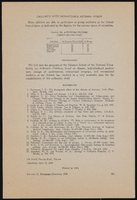Search the Special Collections and Archives Portal
Search Results
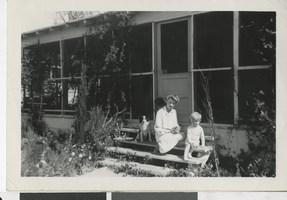
Photograph of Jane Cadogan with her kids, (Nev.), 1950s
Date
Archival Collection
Description
Image

Transcript of interview with Charles and Anne Snavely by Lois Goodall, February 5, 2014 and January 8, 2015
Date
Archival Collection
Description
S. Charles Snavely, a long-time Las Vegas pediatrician, arrived in Nevada in 1965 with his wife, Ann, and two children courtesy of the United States Air Force. The family lived at Nellis Air Force Base while Charlie completed his Barry Plan commitment to the military. In separate interviews, Charlie and Ann discuss their arrival in Las Vegas, their first house in the Glen Heather area of Ward 1, and their current house in the Scotch 80s (pictured above). Charlie and Ann met at a small private hospital in Lebanon, Pennsylvania, where Ann was working as a nurse. The two University of Pennsylvania graduates, now married 63 years, raised their children in their Scotch 80s house and so far have not been tempted to move elsewhere.
Text

Transcript of interview with Thalia Dondero by Susan Scott, March 18, 1978
Date
Archival Collection
Description
On March 18, 1978, Susan Scott interviewed Thalia Dondero (born 1921 in Greeley, Colorado) about her experiences in Nevada and more specifically about her work as a Clark County Commissioner. Dondero first speaks about her background and the circumstances which led her to move to Las Vegas. She also talks about her children, her work with the Parent-Teacher Association, and her service with the Nevada State Park Commission. She also mentions some of her lobbying work for the development of state parks, including a project by National Geographic in which she visited multiple parks, and she later describes the development of the Las Vegas Strip. At the end of the interview, Dondero talks about her involvement in various organizations, her consideration for running for governor, and some of the topics she handles as a commissioner for the county.
Text

Transcript of interview with Lucille Down by James Hanson, February 21, 1972
Date
Archival Collection
Description
On February 21, 1972, James Hanson interviewed Mrs. Lucille Down (born December 14th, 1911 in Wellington, Kansas) in her home in Las Vegas, Nevada. The interview covers the lives of Union Pacific Railroad workers, and local education at schools such as the Las Vegas Grammar School and Las Vegas High School. Lucille discusses her first job, which was at the Southern Nevada Telephone Company. She also mentions having a swamp cooler attached to her family home. She concludes this interview with recollections on the social, recreational, religious and economic, changes that contributed to the development and growth of Las Vegas, Nevada.
Text
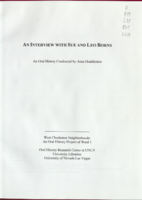
Transcript of interview with Leo Borns and Sue Easley Borns by Anna Huddleston, March 21, 2014
Date
Archival Collection
Description
Leo and Sue (Easley) Borns came to Las Vegas in 1962 to begin an architectural career that would last forty-four years in Southern Nevada. Leo Boms worked for various firms in Las Vegas before developing a reputation as "F. Borns, Architect". He has gone on to design buildings for state public works, Clark County, the City of Las Vegas, Clark County School District, churches, and private home owners. Rarely taking a job outside of Southern Nevada, Leo Boms' intent was to develop an architecture considered indigenous to the area while keeping the conservation of energy and technology as prime importance. Mr. and Mrs. Boms, after living in the area for approximately five years, decided to purchase a home on Strong Drive in McNeil Estates where they raised their three children. Active in social and philanthropic organizations, both Leo and Sue have become acquainted with numerous area personalities. Mr. Boms is most proud of being a part of the development of the Kiwanis Water Conservation Park although his structural designs can be seen throughout the Southern Nevada area. At the age of 77, he closed his office but remains an integral influence on the Greater Las Vegas area.
Text
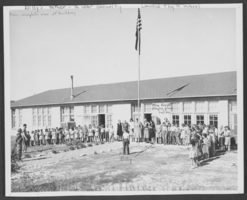
Photograph of Vegas Heights Elementary School, Las Vegas, 1946
Date
Archival Collection
Description
Image
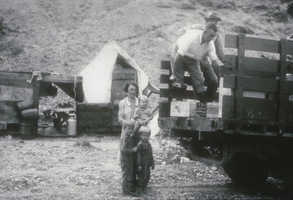
Slide of people at a food truck in Boulder City, Nevada, August 13, 1931
Date
Archival Collection
Description
Image



